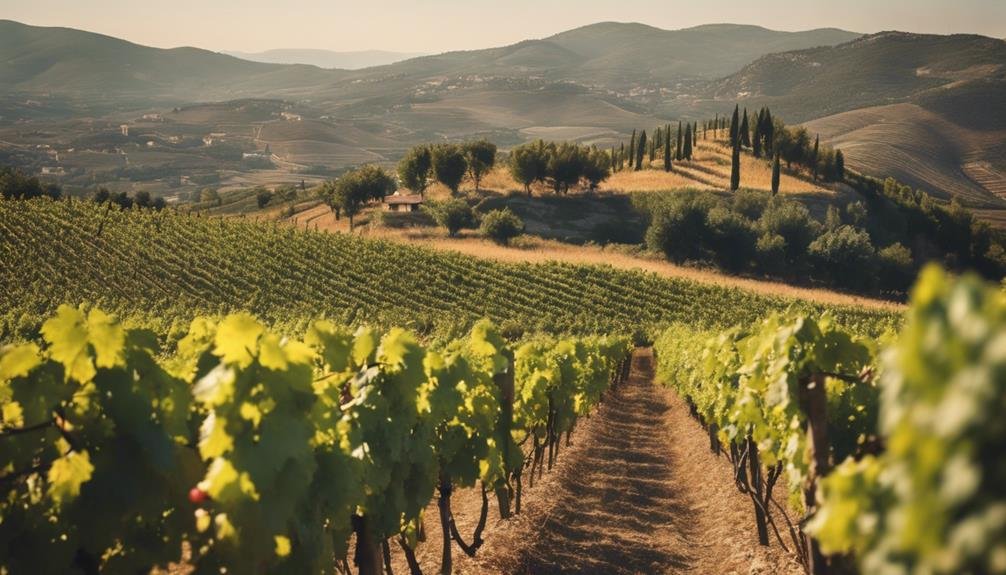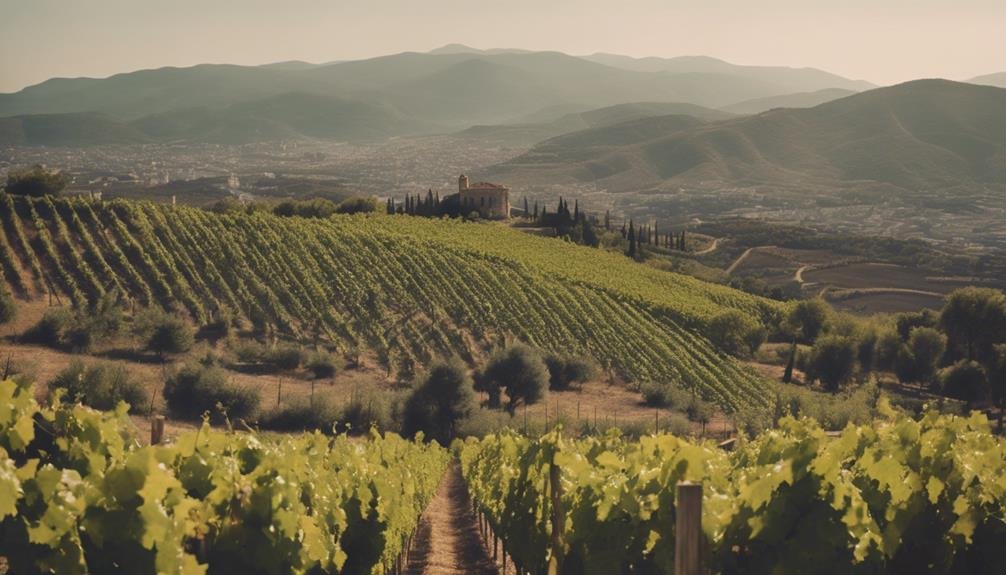Explore Greece's wine regions for a flavorful journey. Northern Greece, including Epirus, Macedonia, and Thrace, boasts unique grape varieties shaped by diverse landscapes. Aegean Islands like Santorini and Samos offer distinct terroirs for Assyrtiko and Muscat Blanc wines. Central Greece, with Attica and Thessaly, blends ancient and modern winemaking techniques, featuring grapes like Savatiano and Xinomavro. Southern Greece, home to Crete, Peloponnese, and Kefalonia, showcases stable Mediterranean climates perfect for aromatic whites. Notable wines like Xinomavro and Assyrtiko are standouts. Uncover more about these regions' rich winemaking heritage.
Northern Greece: Epirus, Macedonia, Thrace
Nestled in the northern reaches of Greece, comprising the wine regions of Epirus, Macedonia, and Thrace, lies a diverse landscape fostering the growth of unique grape varieties and producing wines with distinct characteristics.
The Epirus mountains provide a stunning backdrop for vineyards, influencing the grapes grown in this region. Epirus is known for its crisp white wines, often made from the Malagousia grape, offering an invigorating and aromatic profile.
Moving towards Thrace, vineyards benefit from a continental climate with cold winters and high winds, shaping the flavors of the wines produced. Thrace is particularly renowned for its red wines, showcasing the rich flavors of Xinomavro and Merlot.
The combination of terroir and climate in these regions results in a wide range of high-quality Greek wines.
Aegean Islands: Samos, Santorini, Límnos
Moving from the diverse landscape of Northern Greece, the Aegean Islands, including Samos, Santorini, and Límnos, offer a distinct terroir that shapes the production of unique and flavorful Greek wines. The volcanic terroir of Santorini, influenced by the island's dry climate, is particularly renowned for Assyrtiko wines. Samos and Límnos, on the other hand, bring their own island influences, with Muscat Blanc being a prominent white grape variety. Below is a table summarizing key aspects of the Aegean Islands' wine production:
| Aspect | Santorini | Samos | Límnos |
|---|---|---|---|
| Terroir | Volcanic | Island | Island |
| White Grape | Assyrtiko | Muscat Blanc | Muscat Blanc |
| Island Influence | Dry climate | Unique microclimate | Maritime climate |
Central Greece: Attica, Thessaly

Central Greece, encompassing the wine regions of Attica and Thessaly, boasts a diverse array of grape varieties and terroirs that contribute to its unique winemaking landscape. In Attica, the ancient winemaking tradition continues alongside modern techniques, producing wines that reflect the region's arid climate, similar to California's Napa Valley. Savatiano, Malagousia, and Assyrtiko for whites, and Xinomavro and Agiorgitiko for reds, are prominent grape varieties.
Terracotta amphorae are used in winemaking, adding a traditional touch to the process. Vineyard tours offer a glimpse into this blend of ancient and modern winemaking practices, allowing visitors to appreciate the rich history and innovation that define the wines of Attica and Thessaly.
Southern Greece: Crete, Peloponnese, Kefalonia
Southern Greece, encompassing the wine regions of Crete, Peloponnese, and Kefalonia, showcases a rich diversity of grape varieties and terroirs that contribute to its distinctive winemaking heritage. The region benefits from a stable Mediterranean climate, ideal for producing aromatic white wines. Indigenous grape varieties such as Vilana, Vidiano, and Malvasia for whites, and Kotsifali and Mandilaria for reds, thrive in these conditions, creating unique and flavorful wines.
When it comes to food pairings, these aromatic whites from Southern Greece are perfect matches for dishes like grilled seafood, lemon-infused chicken, or fresh Greek salads. The combination of indigenous grapes and Mediterranean influences results in wines that perfectly complement the rich and diverse cuisine of Greece.
Notable Wines by Region

Highlighting the distinctive wines produced in various regions of Greece sheds light on the remarkable diversity and quality of the country's winemaking industry. Each region showcases unique grape varieties, with Xinomavro and Assyrtiko standing out for their exceptional characteristics. Below is a table summarizing notable wines by region:
| Northern Greece | Aegean Islands | Central Greece | Southern Greece |
|---|---|---|---|
| Xinomavro | Assyrtiko | Savatiano | Vilana |
| Malagousia | Muscat Blanc | Xinomavro | Kotsifali |
| Assyrtiko | Limnio | Agiorgitiko | Mavrodaphne |
| Roditis |
In Northern Greece, Xinomavro offers rich and complex red wines, while Assyrtiko from the Aegean Islands expresses crisp acidity and minerality. Central Greece's Savatiano is known for its versatility, and Southern Greece's Vilana produces aromatic white wines.
Frequently Asked Questions
What Are the Key Climate Differences Between Northern and Southern Greece?
The key climate differences between northern and southern Greece lie in temperature variations and soil types. Northern Greece experiences colder winters with high winds, while the south boasts a stable Mediterranean climate ideal for grape ripening. Rainfall patterns also diverge between the regions.
How Does the Soil Composition Vary Across Greeces Wine Regions?
Soil types across Greece's wine regions vary greatly, influencing grape quality. Northern areas have rocky, mineral-rich soils, aiding drainage. Central regions feature limestone and clay, ideal for red grapes. Southern locales boast sandy, fertile soils, supporting diverse agricultural practices.
Are There Any Unique Winemaking Techniques Specific to Greek Vineyards?
Greek vineyards implement traditional winemaking methods such as Amphora aging, a technique dating back centuries. This practice involves fermenting and aging wine in clay vessels, lending unique flavors and textures to the wines produced in these regions.
What Is the Significance of Indigenous Grape Varieties in Greek Wines?
The significance of indigenous grape varieties in Greek wines lies in their expression of terroir, preserving cultural heritage, embracing sustainability, and meeting evolving market trends. These unique grapes contribute to distinctive flavors, promoting Greece's wine identity.
How Do Greek Wine Production Methods Differ From Other European Countries?
Greek wine production combines traditional techniques with modern practices, setting it apart from other European countries. This blend creates unique flavors and aromas, showcasing the rich history and innovation in winemaking, making Greek wines a delightful experience.
Conclusion
To sum up, the varied wine regions of Greece offer a distinctive and engaging journey through indigenous grape varieties and distinct terroirs. Each region highlights the rich history and modern techniques of Greek winemaking, creating a truly enthralling experience for wine enthusiasts.
Can you imagine the sun-kissed vineyards of Greece producing wines that embody centuries of tradition and innovation?